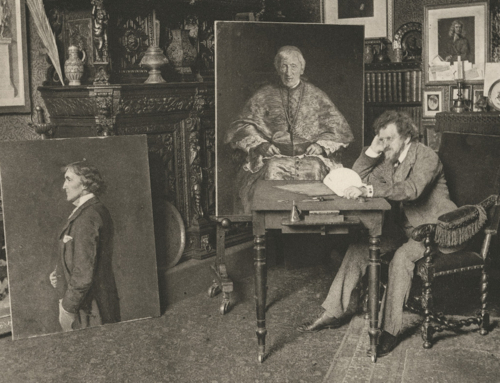The saints are the hermeneuts of the Scriptures. Pope Benedict XVI reminds us of this in Verbum Domini: “The interpretation of Sacred Scripture would remain incomplete were it not to include listening to those who have truly lived the word of God: namely, the saints” (VD 48).
Yet this seems difficult to swallow after reading some of the saints’ interpretations of Scripture, with their allegorical and mystical numerology. For instance, take St. Augustine’s reflections on John 6, the feeding of the five thousand with five loaves and two fishes:
By the five loaves are understood the five books of Moses; and rightly are they not wheaten but barley loaves, because they belong to the Old Testament. And you know that barley is so formed that we get at its pith with difficulty; for the pith is covered in a coating of husk, and the husk itself tenacious and closely adhering, so as to be stripped off with labor. Such is the letter of the Old Testament, invested in a covering of carnal sacraments.
Even St. Thomas, who asserted that all allegorical interpretation must be grounded in the literal sense of Scripture, seems to partake of this perturbing pattern:
This boy had five loaves, that is, the teaching of the law: either because this teaching was contained in the five books of Moses . . . or because it was given to men absorbed in sensible things, which are made known through the five senses.
John Calvin always struck me as more reliable in reading Scripture with his plain and clear style. No numerology, no speculation, just solid exposition and practical exhortation:
Let us now sum up the meaning of the whole miracle. It has this in common with the other miracles, that Christ displayed in it his Divine power in union with beneficence, it is also a confirmation to us of that statement by which he exhorts us to seek the kingdom of God, promising that all other things shall be added to us.
When I was a Calvinist, I thought like a Calvinst, spoke like a Calvinist, and interpreted like a Calvinist. But now as a Catholic I have put Calvinist ways aside, especially with the help of different kind of exegete: John Coltrane.
A number of us student brothers are part of a jazz band which is preparing to play for the Annual Spring Gala this weekend here at the Dominican House of Studies (shameless promotion!). Although trained in classical clarinet I prefer to play jazz, especially the dixieland variety. One reason for this is improvisation: jazz usually involves a main melody or head followed by various musicians’ “readings” of this melody in improvised solos. The soloist gets to offer his own interpretation of the piece and add his own coloring to the music before the band comes together to complete the song. To me this is where the fun, excitement, and skill resides: not just playing but creating.
Now, as any jazz aficionado knows, one cannot simply play anything in these solos; there are chord progressions as well as the theme of the song in general to guide the solo, and any good solo must respect these. But there is plenty of creative space to bring out new treasures from a time-worn piece. And the greater the musician the more creative one can be. Listen as one of the greats, John Coltrane, describes his method:
Here’s how I play: I take off from a point and I go as far as possible. But hopefully, I’ll never lose my way. I say hopefully, because what especially interests me is to discover the ways that I never suspected were possible. My phrasing isn’t a simple prolongation of my musical ideas, and I’m happy that my technique permits me to go very far in this domain, but I must add that it’s always in a very conscious manner.
Perhaps the saints are like this, inspired troubadours of the Gospel who can stretch the meaning of the text to find new and powerful interpretations. Like the jazz soloist their freedom for interpretation is not infinite. Yet there is a creativity to their readings, grounded in a life spent soaking in God’s word, that breaks open familiar passages in unexpected ways.
And it is unfortunately true that not everyone likes jazz; some people prefer the more classical or mundane forms of music. So too some people, like myself in my Protestant days, do not like the hermeneutics of the saints. But this antipathy need not be final or irreversible; perhaps one of these nay-sayers just needs someone to listen with them and explain the beauty, power, and truth of the saints’ solos. Or as Pope Benedict XVI says: “We can point to a fundamental criterion of biblical hermeneutics: the primary setting for scriptural interpretation is the life of the Church” (VD 29).
A world of music without jazz strikes me as a pretty impoverished place. How much more disconcerting is the impoverishment of a world of scriptural interpretation without those great masters, the saints?
✠
Image: Mark Dukes, John Coltrane Icon
John Coltrane is considered a saint only in the 5,000-member African Orthodox Church for which this icon was painted. He is not a canonized Roman Catholic Saint.






